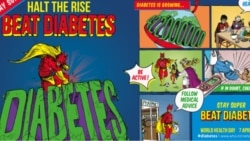Diabetic patients, especially those living in rural Zimbabwe, are finding it difficult to access drugs such as metformin, glibenclamide and insulin injections. The ongoing cash shortages have worsened the problem.
Sugar diabetes is a chronic disease affecting millions of people in the world, including Zimbabweans.
If diagnosed, one has to take specific tablets or inject themselves with drugs for the rest of their lives. Those living with diabetes in Zimbabwe are complaining that public hospitals that usually sell the diabetes drugs at cheaper prices usually are out of stock.
They told Studio 7 that living with diabetes in Zimbabwe has become a curse due to the high costs associated with the condition.
The Diabetic Association of Zimbabwe said a survey they carried out indicates that a diabetic patient needs at least $302 a month for drugs and other related costs.
Georgia Sanyika, a diabetic patient in Dema in Seke communal lands, Mashonaland East province, said accessing the required medicine has become a challenge.
“I am a type 2 diabetic patient but I have been having trouble accessing the drugs that is metformin or insulin. They are not there in our hospitals. It's difficult for me to buy them without medical aid in pharmacies or big hospitals because it’s expensive for a patient who is not going to work. Being diabetic is just expensive for those who are poor, not going to work, or not on medical aid like me. I don’t know why being diabetic is just expensive.”
Sanyika said despite the high costs of the drugs and injection, the prescribed diet for the patients is also expensive.
“Look at the diet, you can’t just follow what is required of you to eat so you end up endangering yourself besides having the condition. I don’t know maybe the government or people who are responsible should help us think about this. What if someone doesn’t have money to buy insulin, does it mean that death is the only solution.”
Dr. John Mangwiro, president of Zimbabwe Diabetic Association, said their members are struggling to survive.
Mangwiro said even the sugar testing equipment used at most public hospitals is backward. “Nowadays the golden standard is HBA1C, it's what other international people are using to really screen, to know who is diabetic and who is not. The machine is still concentrated in private clinics which is expensive costing up to $25 and government has made some movement through machines donated.
“Some central hospital now have this machine but they are limited. We have to wait for donations here and there but when people go to hospital they are screened. It's still not as we want it to be and screening needs to be reorganized and revamped and do much better than we are doing right now.”
Mangwiro added that because diabetes is a life-long condition, patients should be helped to access the necessary medication.
“Strips just like glucometers are not readily available and are expensive. Sometimes they run short in hospitals. Those with diabetics are an unfortunate group because their drugs are quite expensive. They need a lot of expensive services including seeing the doctor, blood and urine tests that need to be done, they need to visit different doctors for eyes and feet which should be screened before they buy the drugs.
“On top of that they need to buy their medication, at one point we were calculating and we found that each patient needs about $302 per month to survive but Zimbabweans are getting much less than that. I have found that some patients end up not taking their medications because they do not have enough (money). Also the medications that are usually there are the old ones. The newer medicines are quite out of reach even for those earning above PDL (poverty datum line).”
Diabetic patients said they are hoping that government will listen to their plight and ensure that diabetic medicines are given for free just like HIV/AIDS drugs.
The association said a number of those living with the condition end up losing their legs or sight. The association also confirmed that those living in rural arrears have to travel to their nearest towns to access the drugs.
IDF Atlas (2005) puts diabetics statistics at about 10 percent of the 14 million Zimbabweans.






